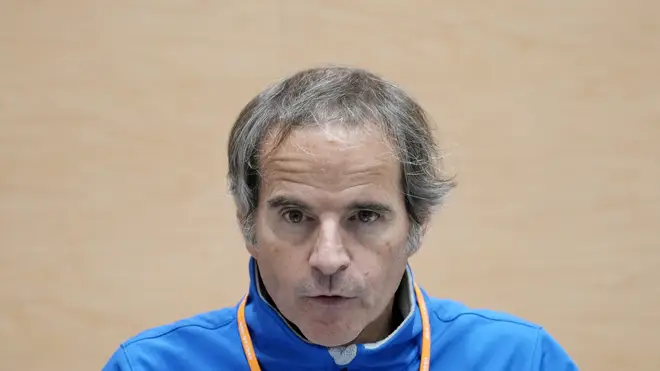
Tom Swarbrick 4pm - 6pm
13 March 2024, 10:24

Rafael Grossi said any restrictions placed on products coming from the region are not based on science.
The head of the UN atomic agency has said that the ongoing discharge of treated radioactive wastewater at the ruined Fukushima nuclear power plant has met safety standards and that any restrictions on products from the region are “not scientific”.
International Atomic Energy Agency (IAEA) director-general Rafael Grossi joined local officials and representatives from fishing and business groups in Fukushima and reassured them that the discharges are being carried out “with no impact to the environment, water, fish and sediment”.
Mr Grossi, who arrived in Japan on Tuesday, visited Fukushima for the first time since the release of the treated water began last August.
He examined the discharge and sampling facility on Wednesday, escorted by Tomoaki Kobayakawa, president of the plant’s operator, Tokyo Electric Power Company Holdings.
At Fukushima Daiichi NPP, where treated water is being released into the ocean in a controlled manner, we reaffirm our commitment: @IAEAorg present before, during, and after this critical operation, ensuring every drop of water is safely discharged. pic.twitter.com/1421erW99G
— Rafael MarianoGrossi (@rafaelmgrossi) March 13, 2024
He last visited the plant in July after issuing an IAEA review predicting only negligible impact from the discharges.
An IAEA comprehensive report later concluded that the discharges meet international safety standards.
The 2011 disaster damaged the Fukushima plant’s power supply and reactor cooling functions, triggering meltdowns of three reactors and causing large amounts of radioactive wastewater to accumulate.
After more than a decade of clean-up work, the plant began discharging the water after treating it and diluting it with large amounts of seawater on August 24, starting a process that is expected to take decades.
The discharges have been opposed by fishing groups and neighbouring countries including China, which banned all imports of Japanese seafood immediately after the release began.
“There is no scientific reason to impose any restriction on products coming from us,” Mr Grossi said at the meeting in Iwaki, south of the Fukushima Daiichi plant.

“This is very important in particular to be said in this forum here in Fukushima,” he said. He noted a “political dimension to this activity since … some neighbouring countries are also manifesting concerns”.
Despite earlier fears that the water discharge would further hurt Fukushima’s hard-hit fishing industry, it has not damaged its reputation domestically.
China’s ban on Japanese seafood mostly hit scallop exporters in Hokkaido. Tokyo has earmarked a fund of more than 100 billion yen (£531 million) that includes compensation and other support, including measures to help find other export destinations.
The discharges are at the beginning of a long process, Mr Grossi said, stressing the importance of “transparency, technical accuracy and wide open, honest dialogue and consultation”.
He stressed that the IAEA has its own office and lab at the Fukushima plant to independently monitor the process.

Mr Grossi said he met with residents not only to highlight the main points about the discharges but “to learn from you”.
He said he would keep coming back to Fukushima and that he is open to hearing residents’ concerns and needs.
Prime Minister Fumio Kishida’s government has reversed earlier plans for a nuclear phaseout and is accelerating the use of nuclear power in response to rising fuel costs related to Russia’s full-scale invasion of Ukraine and pressure to meet decarbonisation goals.
On Tuesday, Mr Grossi expressed support for increasing Japan’s nuclear capacity as the country looks to it as a stable, clean source of power.
Mr Grossi, at a meeting with Economy and Industry Minister Ken Saito, offered Japan technical assistance to improve the idled Kashiwazaki-Kariwa nuclear power plant in Japan’s northcentral region of Niigata, run by the Fukushima Daiichi operator, to address concerns about its past problems with safeguarding measures. It and the government are keen to restart it soon.
The IAEA is sending a team of experts to the plant later this month to assist Tokyo Electric Power Company Holdings’ effort to gain public trust.
The restart remains uncertain because it is subject to the host community’s consent. The January 1 earthquake in the nearby Noto region also rekindled safety concerns.